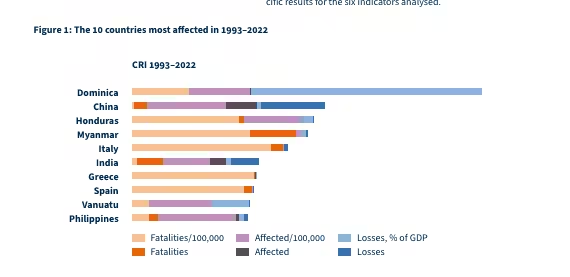Spain Ranks 8th Globally for Extreme Weather Damage
A recent report by Germanwatch, the Climate Risk Index 2025 (CRI), highlights the growing human and economic toll of extreme weather events worldwide. Spain ranks among the top 10 countries most affected by these disasters, with 27,000 deaths and $25 billion in economic losses over the past three decades. The report highlights the urgent need for stronger climate resilience and action as extreme weather events become more frequent and severe.
What is the Climate Risk Index?
The Climate Risk Index (CRI), published annually since 2006, ranks countries based on the human and economic impacts of extreme weather events. It measures fatalities, injuries, and economic losses caused by disasters such as heatwaves, floods, storms, and wildfires. The index analyzes past data to rank the most affected countries, highlighting those most vulnerable to future risks.
Key Findings from the CRI 2025
- Global Impact (1993–2022): Over 765,000 lives lost and $4.2 trillion in economic losses due to more than 9,400 extreme weather events.
- Spain’s Ranking: Spain is the 8th most affected country globally, with 27,000 deaths and $25 billion in damages over the past 32 years.
- Most Vulnerable Regions: Low- and middle-income countries, particularly in the Global South, bear the brunt of climate impacts despite contributing minimally to climate change.
Spain’s Struggle with Extreme Weather
Heatwaves and Droughts
Spain has faced devastating heatwaves, notably in 2003 and 2022, which caused numerous deaths and significant economic losses. The 2022 heatwave, combined with wildfires, led to temperatures soaring to 43°C, resulting in over 11,000 deaths and affecting 3,500 people according to the report. Droughts, such as the one in 1999, have also caused widespread damage to agriculture and infrastructure.
Floods and Storms
In 2019, severe floods in southeastern Spain caused massive destruction, claiming lives and damaging properties, agriculture, and infrastructure. The report notes that the recent DANA floods in Valencia, which claimed over 200 lives and destroyed tens of thousands of homes, businesses, and cars, are not even included in the current rankings. Their impact is expected to further increase Spain’s economic losses in future reports.

Economic and Human Impact
Over the past 32 years, Spain has suffered $25 billion in economic losses due to extreme weather events. Spain’s high number of fatalities, both in total and relative to its population, makes it one of the most vulnerable countries to extreme weather events.
The CRI 2025 ranks countries based on data from EM-DAT, the World Bank, and the International Monetary Fund. Spain’s position highlights the urgent need for climate adaptation and mitigation strategies.
Global Perspective: Vulnerable Nations Bear the Brunt
The report reveals that low- and middle-income countries, particularly in the Global South, are disproportionately affected by extreme weather events. Dominica, China, and Honduras top the list of most impacted nations. Despite contributing minimally to climate change, these countries face the harshest consequences.
Key Findings:
- Heatwaves account for 30% of global deaths caused by extreme weather.
- Floods are responsible for 27% of fatalities.
- Storms cause the highest economic losses, totaling $2.33 trillion (56% of global losses).
A Call to Action
The Climate Risk Index 2025 warns that the world is entering a critical and unpredictable phase of the climate crisis. Extreme weather events are expected to worsen, destabilizing societies and threatening human security worldwide.
For Spain and other even more vulnerable nations, addressing climate change is no longer optional, it is a necessity. Strengthening infrastructure, improving disaster preparedness, and reducing greenhouse gas emissions are crucial steps to mitigate future impacts.
You can read the full Germanwatch report here
Share this content:




2 comments